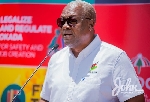Corruption in Ghana: Is there any hope as NPP and NDC claim better record ahead of 2020 election?
 The NDC and NPP have been at the helm of running Ghana since 1992
The NDC and NPP have been at the helm of running Ghana since 1992
Corruption was a major issue in Ghana ahead of the 2016 general elections as opposition parties led by the New Patriotic Party (NPP) launched vitriolic attacks on the government for its inability to decisively deal with the numerous corruption scandals that hit the Mahama administration.
The NPP virtually rode on the back of sustained corruption campaigns to wrest power from the National Democratic Congress (NDC).
It was arguably one of the main reasons the NDC could not hold on to power despite what the party described as “unprecedented infrastructural development” in all sectors of the economy.
As the government was busy showcasing its infrastructure record, which was also captured in the famous green book, the NPP strategically focused on the unending corruption scandals to make the government unpopular and unattractive to voters.
The then opposition party promised to restore integrity to public office and make corruption unattractive to public office holders by strictly applying sanctions against perpetrators.
To demonstrate its commitment to fight the canker, the NPP told Ghanaians that it would set up Office of Special Prosecutor to expeditiously prosecute corruption cases – a promise it has since redeemed after winning the 2016 election.
But with less than two months to the 2020 election, can the NPP claim a better record in the fight against corruption after almost four years in office? Did the corruption scandals that characterized the previous government cease when the NPP assumed office in 2017?
If the Corruption Perception Index (CPI) of Transparency International is anything to go by, then the NPP’s record on corruption has been poor despite establishing the OSP to fight the menace.
This is because it has not been able to perform better than the 43 per cent CPI score of the NDC when it was exiting office in 2016 since taking over power. In the last three years, the NPP government has scored 40, 41, 41 for 2017, 2018 and 2019 respectively in the CPI.
With the level of enthusiasm that the NPP campaigned on corruption in 2016, one would have thought it would raise the bar when it got the opportunity to rule, but its performance has so far been abysmal according to the data, leaving Ghanaians with little hope in overcoming graft as a nation.
Both parties have made new commitments in their 2020 manifestoes to tackle the perennial problem but is it worth trusting the two parties after paying lip service without concrete action over the years?
Ghana loses close to $3 billion to graft annually, according to the Ghana Integrity Initiative, the local chapter of Transparency International. This amount can fix a lot of the bad roads in the country and cut down on the excessive borrowing by successive governments in the name of infrastructural development.
As the country heads for another crucial election, voters are obviously confronted with a tough decision to make as far as corruption is concerned.
Source: Musa Inuwa/Fernilnews.net
Trending News

Murder of US national: Police arrest 2 at Assin Prasso
10:31
Lack of public purse protection ‘pathetic’ – Sam Jonah calls out ‘weaponisation of state agencies against opponents, assault on press freedom'
04:02
Bawumia jets to Italy for bilateral discussions with Pope
13:14
Movement for Change can evolve into a political party in the future: Kyerematen
13:20
Let's do away with 'slash and burn' politics- Adutwum
03:26
Dumsor must stop demo part 2: We’ll choose how we demonstrate and who to partner – Franklin Cudjoe replies Yvonne Nelson
10:17
Clear indication defeat staring NPP in the face - NDC
10:58
NPP sets up disability secretariat
02:46
Train crash: I'd be asking some serious questions were I president – Mahama
07:02
Asantehene commends Matthew Opoku Prempeh for conceiving GENSER Kumasi Pipeline Project
01:37



